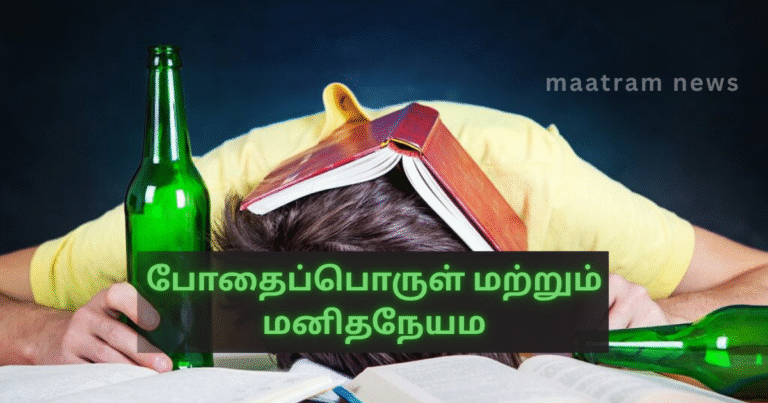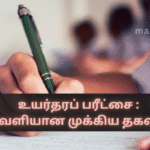இலங்கை ஒரு அழகான தீவு மட்டுமல்ல — அது பண்பாட்டு மரபுகளும் மனிதநேய மதிப்புகளும் நிறைந்த பல்லின சமய சமூகம் வாழ்கின்ற ஒரு நாடு.
ஆனால் இந்நாட்டின் இளைய தலைமுறையினரிடையே நாளுக்கு நாள் பரவி வரும் போதைப்பொருள் பிரச்சினை, சமூகத்தின் அடித்தளத்தையே உருக்குலைக்கும் ஒரு நிழல் போல மாறிவருகிறது.
அரசாங்கம் இன்று மிக வலுவாக “போதைப்பொருளுக்கு எதிராக ஒன்றிணைவோம்” என்ற தேசிய இயக்கத்தை முன்னெடுத்து வருகிறது. காவல் துறையிலிருந்து பாடசாலை வரை, ஆசிரியர்களிலிருந்து பெற்றோர்கள் வரை அனைவரும் ஒரே நோக்கத்தில் ஒன்றிணைய வேண்டிய காலம் இது.
போதைப்பொருள் என்றால் என்ன?
போதைப்பொருள் என்பது மனிதனின் சிந்தனை, உணர்ச்சி மற்றும் நடத்தை மாற்றக்கூடிய வேதிப்பொருள் ஆகும். இது தற்காலிக இன்பத்தை அளிப்பது போல் தோன்றினாலும், நீண்டகாலத்தில் மனநலம், உடல் நலம், குடும்பம், பொருளாதாரம், சமூக உறவுகள் அனைத்தையும் அழிக்கும் சக்தி கொண்டது.
மருத்துவ நோக்கத்திற்கு அப்பாற்பட்ட போதைப்பொருள் பயன்பாடு சட்டவிரோதமானது மேலும் மனித வாழ்க்கையை மரணப்பாதையில் இழுத்துச் செல்கிறது.
போதைப்பொருள் மற்றும் மதுபானம் — சிறு வித்தியாசம்
| அம்சம் | போதைப்பொருள் (Drugs) | மதுபானம் (Alcohol) |
|---|---|---|
| சட்டநிலை | பெரும்பாலும் சட்டவிரோதம் | சட்டப்படி விற்பனை செய்யப்படும் (கட்டுப்பாட்டுடன்) |
| தாக்கம் | உடல், நரம்பு, மனநிலை, சமூக உறவுகள் சிதைவு | கல்லீரல், குடும்ப உறவுகள் மற்றும் சமூக ஒழுக்கம் பாதிப்பு |
| அடிமைத்தன்மை | மிக வேகமாக உருவாகும் | மெதுவாக உருவாகும் ஆனால் ஆபத்தானது |
| சமூக விளைவு | குற்றச்செயல்கள், வன்முறை, உடல்நல வீழ்ச்சி | குடும்ப தகராறு, விபத்துகள், வறுமை |
இரண்டுமே ஒரே பிரச்சினையின் இரு முகங்கள் — இரண்டும் மனநல அழிவு மற்றும் சமூகச் சிதைவு ஏற்படுத்துகின்றன.
உலகளாவிய நிலைமை
ஐ.நா. போதைப்பொருள் மற்றும் குற்றப்பிரிவு (UNODC) 2024 அறிக்கையின் படி,
உலகளவில் 296 மில்லியன் பேர் குறைந்தது ஒரு வகை போதைப்பொருள் பயன்படுத்தியுள்ளனர்.
அதில்:
- 219 மில்லியன் பேர் கஞ்சா (Cannabis)
- 60 மில்லியன் பேர் ஒப்பியாய்ட் (Heroin, Morphine)
- 17 மில்லியன் பேர் செயற்கை போதைப்பொருள் (Methamphetamine, Ecstasy) பயனாளிகள்
இந்த எண்ணிக்கை வெறும் புள்ளிவிபரமல்ல — அது மனித சமூகம் தன்னைத் தானே நச்சாக்கிக் கொள்கிறது என்பதற்கான எச்சரிக்கை.
இலங்கையின் தற்போதைய நிலை
அதிகமாகப் பயன்படும் போதைப்பொருட்கள்
- ஹீரோயின் (Heroin) – பெரும்பாலும் இந்தியா வழியாகக் கடத்தப்படும் மிக ஆபத்தான போதைப்பொருள்.
- கஞ்சா (Cannabis) – நாட்டின் சில பகுதிகளில் சட்டவிரோதமாக பயிரிடப்படுகிறது.
- மெத்தாம்பெட்டமைன் (Meth/ICE) – இளைய தலைமுறையில் வேகமாக பரவி வருகிறது.
- மருந்துப் பொருள் தவறான பயன்பாடு (Tramadol, Diazepam) – புதிய ஆபத்து.
அரசு நடவடிக்கைகள்
2023 இறுதியில் தொடங்கப்பட்ட போதைப்பொருளுக்கான எதிர்ப்பு மூலம், நாடு முழுவதும் போதை விற்பனையாளர்கள் மற்றும் கடத்தல்காரர்களுக்கு எதிராக தீவிர சட்ட நடவடிக்கைகள், கைதுகள் நடத்தப்படுகின்றன.
2025 இல் மட்டும் 2 லட்சத்திற்கும் மேற்பட்ட கைது நடவடிக்கைகள் மேற்கொள்ளப்பட்டுள்ளன.
சமூக விளைவுகள்
- குடும்ப வன்முறை, விவாகரத்து அதிகரிப்பு
- வேலைவாய்ப்பு இழப்பு, வறுமை
- இளைய தலைமுறை கல்வியிலிருந்து விலகல்
- சமூக ஒழுக்கம் மற்றும் பாதுகாப்பு பாதிப்பு
போதைப்பொருள் பாதிப்புகள் — உளவியல், உடல் மற்றும் சமூக அளவில்
| வகை | தாக்கம் |
|---|---|
| உளவியல் (Psychological) | மனச்சோர்வு, பயம், மாயக்காட்சி, நினைவிழப்பு, தற்கொலை எண்ணம் |
| உடல் (Physical) | கல்லீரல், நரம்பு, இதய, சுவாச பிரச்சினைகள் |
| சமூக (Social) | குடும்ப உறவு சிதைவு, குற்றம், வேலை இழப்பு, வறுமை, சமூக ஒதுக்கல் |
ஒரு போதைப் பொருள் அடிமை தனிமனிதரையே அல்ல — அவரின் குடும்பத்தையும் சமூகத்தையும் அழிக்கிறான்.
மனிதநேய பார்வையில் — நாம் எப்படி பார்க்க வேண்டும்?
போதைப்பொருள் பயனாளி ஒரு குற்றவாளி அல்ல;
அவர் ஒரு மனநல பிரச்சினையால் பாதிக்கப்பட்ட மனிதர்.
அவரை வெறுப்பதற்குப் பதிலாக, புரிந்துகொள்வதே உண்மையான மனிதநேயம்.
நாம் அவர்களை எவ்வாறு பாதுகாக்க வேண்டும்
A. தனிநபர் அளவில்
- குற்றமாக பார்க்காமல் சிகிச்சை பெற ஊக்குவிக்க வேண்டும்.
- அவர்களுக்கு மனநல ஆலோசனை வழங்க வேண்டும்.
- சமுதாய நிகழ்வுகளில் சேர்த்துக் கொள்ள வேண்டும்.
B. குடும்ப அளவில்
- குற்ற உணர்வை ஏற்படுத்தாமல் நேசத்துடன் அணுகுதல்.
- குடும்ப ஆலோசனைக்கு பங்கேற்பது.
- அவரின் சிறு முன்னேற்றத்தையும் பாராட்டுதல்.
C. சமூக மற்றும் அரச அளவில்
- மறுவாழ்வு மையங்கள் (Rehabilitation Centres):
போதைப்பொருள் விட்டவர்களுக்கு தொழில் பயிற்சி, வேலை வாய்ப்பு. - விழிப்புணர்வு கல்வி (Education & Awareness):
பள்ளி, கல்லூரிகளில் போதைத் தடுப்பு பாடங்கள். - சட்ட மாற்றங்கள்:
தண்டனையின் மீது கவனம் அல்ல; மறுவாழ்வில் கவனம். - NGO & மத அமைப்புகள்:
மனஅழுத்தம், வறுமை போன்ற காரணிகளை குறைக்கும் திட்டங்கள்.
சமூகமயமாக்கல் (Social Reintegration) — மீண்டவர்களை சமூகத்தில் இணைப்பது
அடையாளப்படுத்தல்
பாடசாலைகள், சுகாதாரப் பணியாளர்கள், சமூகப் பணியாளர்கள் இணைந்து பாதிக்கப்பட்டவர்களை முன்னதாக அடையாளப்படுத்த வேண்டும்.
சிகிச்சை மற்றும் ஆலோசனை
மருத்துவ, உளவியல் மற்றும் தொழில்பயிற்சி மூலம் மறுவாழ்வு ஏற்படுத்த வேண்டும்.
வேலை மற்றும் தொழில் இணைப்பு
அரசு மற்றும் தனியார் துறைகள் இணைந்து “Second Chance Employment Programs” உருவாக்க வேண்டும்.
குடும்ப மீள்இணைப்பு
குடும்ப ஆலோசனை, உறவு மீட்பு, சமூக பங்கு ஏற்படுத்தல்.
சமூக பங்களிப்பு
பாடசாலைகள், மத அமைப்புகள், ஊடகங்கள், இளைஞர் கிளப்புகள் வழியாக விழிப்புணர்வு நிகழ்வுகள் நடத்த வேண்டும்.
சமூகத்தின் பங்கு — அனைவரும் ஒன்றாக
- பாடசாலைகள் – மாணவர்களுக்கு “Life Skills” பாடத்திட்டம் வழியே போதைத் தடுப்பு கல்வி.
- மதஅமைப்புகள் – ஆன்மீக மதிப்புகள் மூலம் மயக்கம் விலக வழிகாட்டுதல்.
- தொழில்துறை நிறுவனங்கள் – மறுவாழ்வில் உள்ளவர்களுக்கு வேலை வாய்ப்பு.
- ஊடகங்கள் – “போதைவாளி” என அல்ல, “மீள்பவர்” என கதை சொல்லல்.
- தன்னார்வ அமைப்புகள் மற்றும் சமூகப்பணியாளர்கள் – மறுவாழ்வு மையங்கள், குடும்ப ஆலோசனைகள், சமூக விழிப்புணர்வு.
அரசாங்கத்தின் நோக்கம் — “போதைப்பொருள் இல்லா இலங்கை”
அரசாங்கம் இன்று “ஒரே இலக்கு – போதையற்ற நாடு” என்ற நோக்கத்தில், காவல் துறை, சுகாதாரத்துறை, கல்வித் துறை, சமூகப் பணியாளர்கள் ஆகியோரை இணைத்து மக்களுடன் கூட்டாக செயல்படும் தேசிய முயற்சியை முன்னெடுத்து வருகிறது.
அரசாங்கத்தால் மேற்கொள்ளப்படும் தேசிய ரீதியான இந்த செயற்பாடு, சட்ட நடவடிக்கையோடு மட்டுமல்லாது மறுவாழ்வு மற்றும் சமூக இணைப்பையும் முக்கியமாகக் கருதுகிறது.
மனிதநேயத்தின் வழியே விழிப்புணர்வு
போதைப்பொருள் பிரச்சினை ஒரு நாட்டின் எதிர்காலத்தை சிதைக்கக்கூடியது.
ஆனால் அதனை எதிர்கொள்வதற்கான சக்தி நமக்குள் தான் உள்ளது — அது அறிவு, அனுதாபம், மற்றும் ஒற்றுமை.
“ஒரு மனிதனை மீட்டால் ஒரு குடும்பம் காப்பாற்றப்படும்;
ஒரு குடும்பம் காப்பாற்றப்பட்டால் ஒரு சமூகம் உயரும்;
ஒரு சமூகம் உய்ந்தால் ஒரு நாடு மீளும்.”
நாம் அனைவரும் சேர்ந்து —
“போதைப்பொருளுக்கு எதிராக ஒன்றிணைவோம்”
என்று விழிப்புணர்வின் பாதையில் ஒன்றாகப் பயணிப்போம்.
மேலதிக தகவல்களுக்கு மாற்றம் செய்திகள் இணையத்தளத்தினுள் பிரவேசியுங்கள்.
மேலதிக தகவல்களை உடனுக்குடன் பெற்றுக்கொள்ள மாற்றம் செய்திகள் முகநூல் பக்கத்தை பின்தொடரவும்.
Drugs and Humanity: Together on the Path of Awareness
Introduction
Sri Lanka is not just a beautiful island — it is a land rich in cultural heritage and humanitarian values, where people of many races and religions live together.
However, the growing drug problem among the country’s youth has become a shadow that threatens to erode the very foundation of society.
Today, the government is strongly promoting a national campaign titled “Let’s Unite Against Drugs.”
From the police to schools, from teachers to parents — this is the time for everyone to come together with a single goal.
What is a Drug?
A drug is a chemical substance that can alter a person’s thoughts, emotions, and behavior.
Although it may seem to give temporary pleasure, in the long run, it destroys mental health, physical health, family life, the economy, and social relationships.
The use of drugs beyond medical purposes is illegal — and leads human life down the path of destruction.
Drugs and Alcohol — A Subtle Difference
| Aspect | Drugs | Alcohol |
|---|---|---|
| Legal Status | Mostly illegal | Legally sold (with regulation) |
| Impact | Damages body, nerves, mind, and social relationships | Affects liver, family relationships, and social ethics |
| Addiction | Develops rapidly | Develops slowly but is dangerous |
| Social Consequences | Crime, violence, health deterioration | Family disputes, accidents, poverty |
Both are two sides of the same issue — both cause mental decline and social breakdown.
The Global Situation
According to the UN Office on Drugs and Crime (UNODC) 2024 report,
296 million people worldwide have used at least one type of drug.
Among them:
- 219 million people use Cannabis
- 60 million use Opioids (Heroin, Morphine)
- 17 million use synthetic drugs like Methamphetamine and Ecstasy
These numbers are not mere statistics — they are a warning that humanity is poisoning itself.
The Current Situation in Sri Lanka
Most Commonly Used Drugs
- Heroin – Highly dangerous, mostly smuggled through India
- Cannabis – Illegally cultivated in some parts of the country
- Methamphetamine (Meth/ICE) – Rapidly spreading among the youth
- Misuse of Medical Drugs (Tramadol, Diazepam) – A growing threat
Government Actions
Following the anti-drug campaign launched in late 2023, strict legal actions and arrests have been carried out nationwide against drug dealers and traffickers.
In 2025 alone, more than 200,000 arrests have been made.
Social Impact
- Increase in domestic violence and divorces
- Unemployment and poverty
- School dropouts among youth
- Decline in social order and safety
Effects of Drugs — Psychological, Physical, and Social
| Type | Impact |
|---|---|
| Psychological | Depression, anxiety, hallucinations, memory loss, suicidal thoughts |
| Physical | Liver, nerve, heart, and respiratory problems |
| Social | Family breakdown, crime, unemployment, poverty, and social exclusion |
A drug addict destroys not only himself — but also his family and community.
The Humanitarian Perspective — How Should We See It?
A drug user is not a criminal;
He is a human being suffering from a mental health issue.
Instead of hating them, understanding and compassion are the true forms of humanity.
How We Should Protect Them
A. Individual Level
- Encourage treatment instead of viewing it as a crime.
- Provide mental health counseling.
- Include them in social and community events.
B. Family Level
- Approach them with love, not guilt.
- Participate in family counseling.
- Appreciate even small improvements in their behavior.
C. Social and Governmental Level
- Rehabilitation Centres:
Offer vocational training and employment for recovered individuals. - Education & Awareness:
Introduce anti-drug education in schools and universities. - Legal Reforms:
Focus more on rehabilitation rather than punishment. - NGOs & Religious Organizations:
Implement programs to reduce stress, poverty, and related causes.
Social Reintegration — Bringing Recovered Individuals Back into Society
Identification
Schools, healthcare workers, and social workers should work together to identify affected individuals early.
Treatment and Counseling
Provide medical, psychological, and vocational support for rehabilitation.
Employment and Vocational Integration
The government and private sector should collaborate to create “Second Chance Employment Programs.”
Family Reintegration
Encourage family counseling, relationship rebuilding, and social participation.
Social Participation
Schools, religious institutions, media, and youth clubs should conduct awareness programs regularly.
The Role of Society — Everyone Together
- Schools – Include “Life Skills” education to prevent drug use among students.
- Religious Institutions – Guide youth toward spirituality and moral living.
- Industries – Provide employment for those undergoing rehabilitation.
- Media – Portray them not as “addicts,” but as “recovering individuals.”
- Voluntary and Social Workers – Conduct rehabilitation, family counseling, and awareness programs.
Government’s Vision — “A Drug-Free Sri Lanka”
The government’s mission today is “One Goal – A Drug-Free Nation.”
It brings together the police, health sector, education sector, and social workers to work collectively with the people.
This national initiative emphasizes not only law enforcement but also rehabilitation and social reintegration.
Awakening Through Humanity
The drug problem can destroy the future of a nation.
But the power to fight it lies within us — through knowledge, empathy, and unity.
“When one person is saved, a family is protected;
When a family is protected, a community rises;
When a community rises, a nation is reborn.”
Let us all unite and walk together on the path of awareness —
“Let’s Unite Against Drugs.”



